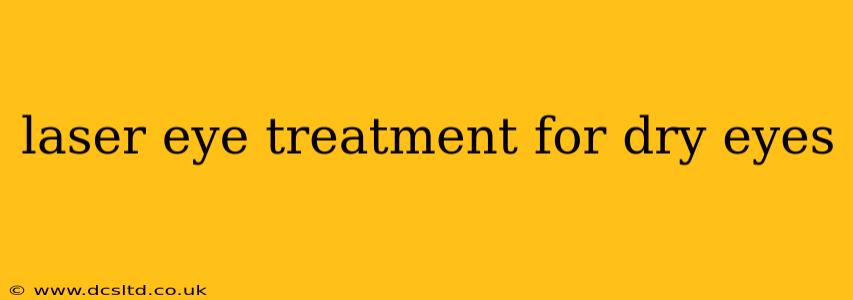Dry eyes are a common condition affecting millions, causing discomfort, irritation, and even impacting vision. While many treatments exist, some individuals explore laser eye treatments as a potential solution. This comprehensive guide delves into the relationship between laser eye surgery and dry eyes, exploring whether laser treatments can help alleviate symptoms or even cause them. We'll address common questions and concerns surrounding this topic.
Can Laser Eye Surgery Cause Dry Eyes?
Yes, some laser eye surgeries, particularly LASIK (Laser-Assisted In Situ Keratomileusis), can contribute to dry eye symptoms. This is because the procedure involves creating a flap in the cornea, potentially disrupting the tear film's natural production and distribution. The procedure may also slightly alter the corneal nerves responsible for tear production and secretion. While not experienced by everyone, dry eyes are a common side effect, often temporary, but sometimes persistent.
What Types of Laser Eye Treatments Are There?
Several laser eye treatments exist, each addressing different refractive errors (nearsightedness, farsightedness, astigmatism). However, it's crucial to understand that none are specifically designed to treat dry eyes. The most common procedures include:
- LASIK: The most popular refractive surgery, using a laser to reshape the cornea.
- PRK (Photorefractive Keratectomy): Removes the outer layer of the cornea before reshaping with a laser. Often associated with a longer recovery period and increased risk of dry eyes compared to LASIK.
- SMILE (Small Incision Lenticule Extraction): A bladeless technique creating a small incision to remove a lenticule of corneal tissue. Generally considered to have a lower risk of dry eye complications than LASIK.
Does Laser Eye Surgery Help Dry Eyes?
No, laser eye surgery itself does not treat dry eyes. In fact, as mentioned, it can sometimes worsen existing dry eye symptoms or even induce them in individuals who previously did not experience them. If you suffer from dry eyes, addressing the underlying cause is crucial before considering refractive surgery. Your ophthalmologist will assess your suitability for laser surgery and discuss potential risks, including dry eye development.
How Can I Treat Dry Eyes After Laser Eye Surgery?
If dry eyes develop after laser eye surgery, your ophthalmologist will likely recommend various treatments, including:
- Artificial tears: These lubricating eye drops are frequently prescribed to supplement natural tear production.
- Punctal plugs: Small devices inserted into the tear ducts to prevent tear drainage, thereby increasing tear film retention on the eye's surface.
- Warm compresses: Applying warm compresses can help soothe irritated eyes and stimulate tear production.
- Lid hygiene: Cleaning the eyelids helps remove debris that can contribute to dry eye symptoms.
- Prescription medications: In severe cases, your doctor might prescribe medication like Restasis (cyclosporine) to reduce inflammation and stimulate tear production.
What are the risks of laser eye surgery for someone with dry eyes?
Individuals with pre-existing dry eyes face a higher risk of experiencing worsened symptoms or prolonged recovery after laser eye surgery. The surgery itself can exacerbate the condition, leading to increased discomfort and potentially affecting the visual outcome. Thorough pre-operative evaluation is crucial to assess the risks and benefits.
Can I get laser eye surgery if I have dry eyes?
While not impossible, it's less likely that someone with severe dry eyes will be a good candidate for laser eye surgery. Your ophthalmologist will conduct a thorough eye exam to assess the severity of your dry eyes and determine if surgery is safe and appropriate. Treatment for your dry eyes may be recommended before considering laser surgery.
Conclusion
Laser eye surgery offers a life-changing opportunity for many to improve their vision, but it’s not a cure-all, especially for dry eye conditions. If you are considering laser eye surgery and have concerns about dry eyes, a thorough consultation with an experienced ophthalmologist is crucial. They can assess your individual situation, discuss the risks and benefits, and help you make an informed decision that aligns with your health and visual needs. Remember, open communication with your eye doctor is key throughout the entire process.
